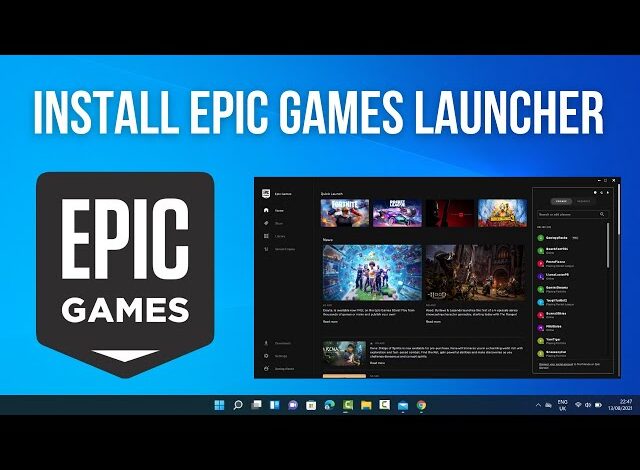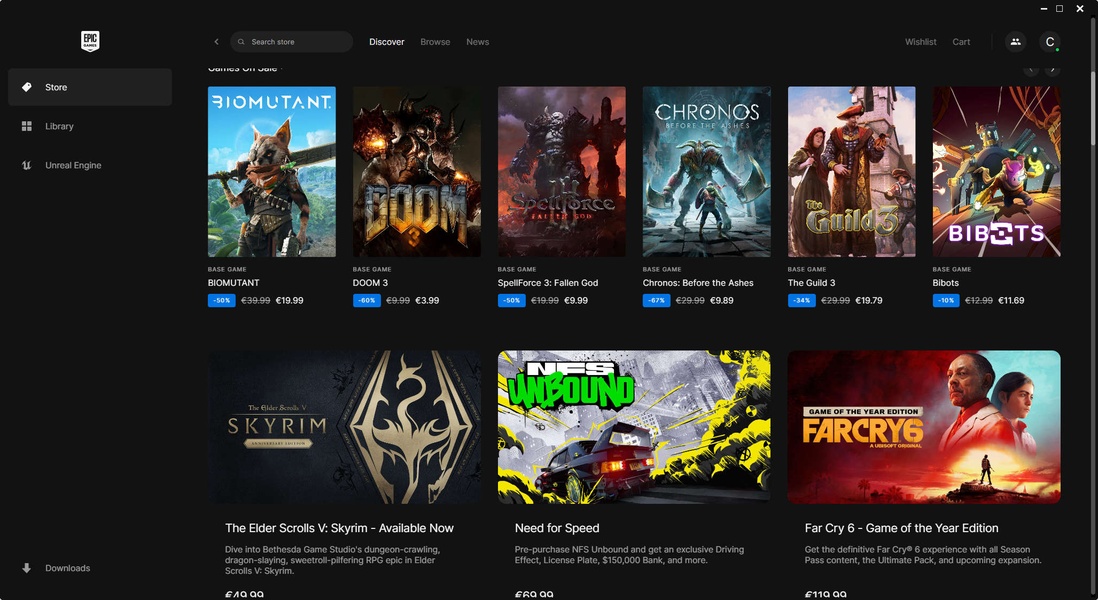Epic Games Launcher: Revolutionizing How We Play, Download, and Connect

Introduction: The Gateway to a New Era of Gaming
Epic Games Launcher in the dynamic landscape of digital gaming, one name that has consistently stirred conversation, innovation, and even a bit of controversy is the Epic Games Launcher. Once seen as merely a competitor to the omnipresent Steam, Epic’s platform has grown into something far more ambitious—a multifaceted hub that reshapes how gamers discover, purchase, and play games.
Unlike other digital distribution services, Epic Games Launcher doesn’t just aim to sell titles—it strives to redefine the relationship between developers and players. With its sleek interface, impressive performance, and generous incentives for both creators and consumers, it has steadily carved out its own empire in the digital gaming realm.
The launcher is not merely a tool to start games; it’s a symbol of Epic’s broader ecosystem, tying together Unreal Engine, Fortnite, the Epic Games Store, and even cross-platform social connectivity. What was once a simple utility has evolved into a sophisticated gaming infrastructure that continues to influence the market in profound ways.
But what exactly makes the Epic Games Launcher so “epic”? Let’s dive deeper into what sets it apart and why it has become one of the most significant platforms in the modern gaming industry.
1. The Interface: Sleek, Intuitive, and Built for Gamers

The first thing that greets any user when they open the Epic Games Launcher is its striking simplicity. The interface is polished, minimalistic, and surprisingly fast—qualities that many gamers value more than they realize. Epic’s approach to design is clear: reduce clutter, increase accessibility, and make navigation almost instinctive.
Upon logging in, users are greeted by a clean sidebar that categorizes everything logically—Store, Library, Friends, Unreal Engine, and Settings. Each section feels deliberate and smooth, offering just the right mix of information and aesthetics. Unlike some competitors that overload users with promotional banners or flashing sale notifications, Epic’s layout feels mature and focused. It respects your time.
The Library tab, in particular, deserves praise. It provides a well-organized collection of owned games, clearly displaying which are installed, updated, or ready to play. Each title is showcased with rich visuals, giving the feeling that every game is a prized possession.
Furthermore, the integration with the Unreal Engine and the Epic Games Store makes the launcher not just a gaming hub but also a creative workspace for developers. For those working on projects in Unreal Engine, having both development tools and gaming access under one umbrella is nothing short of brilliant.
2. The Storefront: A Challenger to Steam’s Throne
When the Epic Games Store launched in December 2018, few expected it to challenge the dominance of Steam. Yet, Epic approached it with boldness—and perhaps a bit of defiance. Their strategy wasn’t to imitate, but to innovate through generosity.
At the core of Epic’s business model lies the 88/12 revenue split, where developers receive 88% of the profit while Epic retains just 12%. This was a daring contrast to Steam’s traditional 70/30 split, signaling a clear message: Epic values creators. This simple yet revolutionary approach attracted a wave of indie developers and major studios alike, reshaping the digital marketplace landscape.
Beyond that, the Free Games Program has been a masterstroke. Every week, Epic offers one or more free titles—ranging from indie gems to blockbuster hits—to anyone with an account. These aren’t trial versions; they’re full games, permanently added to your library. It’s a strategy that not only builds user loyalty but also encourages exploration of genres and developers that players might otherwise overlook.
Additionally, Epic’s focus on exclusive releases—though controversial at first—has proven effective in driving attention. Games like Borderlands 3, Control, and Alan Wake 2 launched as Epic exclusives, generating both debate and downloads. Whether one agrees with the practice or not, it undeniably reshaped how gamers and publishers view distribution power in the PC space.
3. Performance and Reliability: Where Speed Meets Stability
The Epic Games Launcher has undergone notable evolution in terms of performance. Early adopters might recall a time when updates felt heavy or installations lagged. But today, Epic has fine-tuned its system to be exceptionally responsive. Downloads are swift, patches install seamlessly, and game launching feels immediate.
One standout feature is its background optimization. Unlike some platforms that consume significant resources even when idle, Epic’s launcher maintains a lightweight footprint. It’s efficient without being intrusive—an achievement that tech enthusiasts deeply appreciate.
Moreover, Epic’s cloud save functionality ensures that progress is never lost. Players can effortlessly switch between systems or reinstall games without fear of losing their achievements or settings. This reliability has elevated the launcher’s reputation, transforming it from a utility tool into a trusted gaming partner.
Epic also invests heavily in cross-platform support. Whether you’re playing on PC, macOS, or even syncing with your console account through Fortnite, the integration remains fluid. In a world where cross-play and cross-progression are becoming the norm, Epic stands at the forefront of making gaming truly borderless.
4. Beyond Gaming: A Hub for Community and Creativity
What sets the Epic Games Launcher apart from its peers is that it doesn’t limit itself to playing games—it also cultivates a sense of community and creativity. The launcher’s social features are designed to make connecting with friends not just easy, but genuinely enjoyable.
Through integrated friend lists, party systems, and cross-platform chat, players can link their experiences across games and devices. Whether you’re building in Fortnite, exploring Rocket League, or testing a new Unreal Engine prototype, the social connection feels seamless.
But perhaps the most inspiring part of Epic’s vision is how it nurtures creators and developers. Through direct access to the Unreal Engine from the launcher, Epic has effectively bridged the gap between players and makers. Aspiring developers can start projects, test builds, and even distribute demos through the same ecosystem where gamers play.
In this way, the Epic Games Launcher becomes a creative conduit—a digital studio where art, code, and imagination collide. This ecosystem promotes a future where the line between player and developer blurs, empowering a generation of creators to emerge from the very audience that consumes their work.
5. The Future of Epic Games Launcher: Innovation in Motion
Looking forward, it’s clear that Epic isn’t content to simply compete—it aims to redefine what a game launcher can be. The company’s roadmap hints at deeper integration of social experiences, more advanced mod support, and even potential expansions into cloud gaming.
Given Epic’s history of disrupting industries—from the Unreal Engine’s dominance in game development to Fortnite’s reshaping of live service models—it’s reasonable to expect the launcher to follow suit. Imagine a future where players can stream games instantly, share creations directly, or even host in-launcher tournaments with real-time spectating—all without leaving the Epic ecosystem.
Moreover, Epic’s investment in the Metaverse vision suggests that the launcher could eventually serve as a portal to vast interconnected experiences. It may not just be a launcher—but a digital universe launcher, bridging games, tools, and virtual communities into one immersive framework.
The trajectory is clear: the Epic Games Launcher isn’t standing still. It’s evolving, adapting, and expanding, much like the industry it fuels.
Conclusion: More Than a Launcher—A Digital Legacy in the Making
In a market crowded with platforms vying for attention, the Epic Games Launcher has distinguished itself through bold strategies, user-centric design, and a fearless commitment to change. It’s not perfect—no platform is—but its impact is undeniable.
From generous developer revenue models to weekly free games, from cross-platform functionality to integration with world-class creation tools, Epic has built more than a launcher; it has built a movement. It challenges conventions, invites creativity, and constantly reminds the industry that innovation still matters. The Epic Games Launcher is not just a tool to start your favorite games. It’s a statement of what gaming distribution should aspire to be—open, fair, beautiful, and forward-thinking. And as it continues to evolve, one thing becomes increasingly clear: the word “epic” in its name isn’t an exaggeration—it’s a promise.



